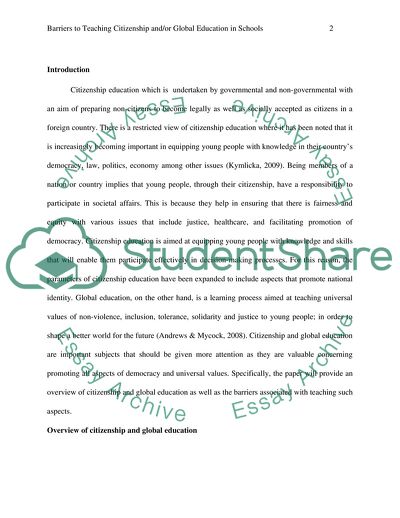Cite this document
(Barriers to Teaching Citizenship and/or Global Education in Schools Literature review Example | Topics and Well Written Essays - 4500 words - 1, n.d.)
Barriers to Teaching Citizenship and/or Global Education in Schools Literature review Example | Topics and Well Written Essays - 4500 words - 1. https://studentshare.org/education/1819477-what-are-the-barriers-to-teaching-citizenship-andor-global-education-in-schools
Barriers to Teaching Citizenship and/or Global Education in Schools Literature review Example | Topics and Well Written Essays - 4500 words - 1. https://studentshare.org/education/1819477-what-are-the-barriers-to-teaching-citizenship-andor-global-education-in-schools
(Barriers to Teaching Citizenship and/Or Global Education in Schools Literature Review Example | Topics and Well Written Essays - 4500 Words - 1)
Barriers to Teaching Citizenship and/Or Global Education in Schools Literature Review Example | Topics and Well Written Essays - 4500 Words - 1. https://studentshare.org/education/1819477-what-are-the-barriers-to-teaching-citizenship-andor-global-education-in-schools.
Barriers to Teaching Citizenship and/Or Global Education in Schools Literature Review Example | Topics and Well Written Essays - 4500 Words - 1. https://studentshare.org/education/1819477-what-are-the-barriers-to-teaching-citizenship-andor-global-education-in-schools.
“Barriers to Teaching Citizenship and/Or Global Education in Schools Literature Review Example | Topics and Well Written Essays - 4500 Words - 1”. https://studentshare.org/education/1819477-what-are-the-barriers-to-teaching-citizenship-andor-global-education-in-schools.


